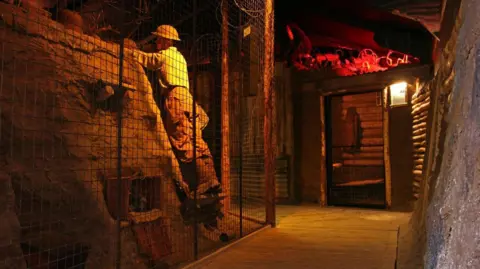Owners of WW2 museum and ex-prison camp sell up
 Eden Camp/Christie & Co
Eden Camp/Christie & CoA well-known World War Two visitor attraction that has been owned by the same family for 40 years has been put up for sale for the first time.
Agents Christie & Co said they were expecting "substantial offers" for Eden Camp, a living history museum near Malton in North Yorkshire.
The current owners' father, Stan Johnson, developed the attraction after buying the former prisoner of war camp in the 1980s.
His son Howard said that he and his sister had made the "tough decision to pass the reins" after running it since their father's death 10 years ago.
 Eden Camp/Christie & Co
Eden Camp/Christie & CoEden Camp attracts around 125,000 visitors each year and is a popular venue for school groups, with around 25,000 children visiting in 2023.
The camp was built in early 1942 to accommodate captured Italian servicemen who were put to work on nearby farms. Polish and German prisoners were later interred there.
The original huts where they slept and ate are still in situ, and each is themed around a different aspect of the war, from rationing to U-boats.
Mr Johnson invested £750,000 in his vision and the museum opened in 1987.
Eden Camp is now an immersive experience that uses sounds, smells and moving figures to recreate events such as the Blitz.
The museum also works closely with veterans' groups to develop displays about social and military history and its archives have become a nationally important resource.
'Seeking right custodians'
Mr Johnson's daughter, Paula Peace, said: "Howard and I are extremely proud that this has been a family business for 40 years and we want to ensure Eden Camp is being sold with the intention that it stays as a museum for future generations to enjoy".
Her brother added they had been contacted on previous occasions by interested parties asking if they would sell the business.
"We are looking for the right custodians to take over and to carry on where we have left off," he said.
Jon Patrick, who is overseeing the sale for Christie & Co, said they had already seen interest since the announcement was made.
He added Eden Camp could appeal to an "international buyer audience" because of its unique particulars.
After the prisoners left, the camp was converted into accommodation for agricultural workers and was at one point used for rearing pheasants.
When Mr Johnson bought the site, he was planning to open a factory, but was inspired to preserve the huts after a visit by some Italian men who had been held there.
Listen to highlights from North Yorkshire on BBC Sounds, catch up with the latest episode of Look North or tell us a story you think we should be covering here.
